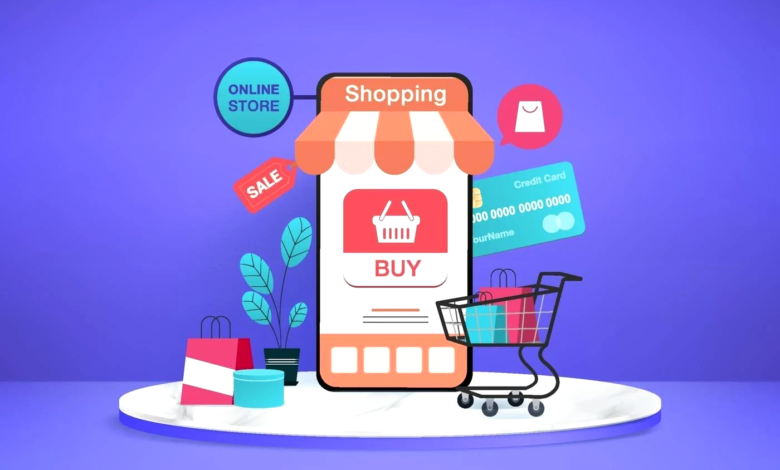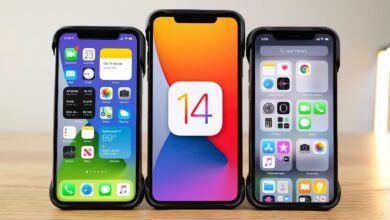
It is not enough to have a responsive or mobile website in a highly competitive eCommerce industry to succeed. If your company doesn’t have an eCommerce mobile app, you miss a number of opportunities and even if you do the utmost effort to attract many clients, your business does not expand.
Mobile apps are an indispensable aspect to reach larger audiences thanks to modern technologies. The way businesses may communicate with their customers have altered with mobile applications. There is no dependence on newsletters or printable media to promote special deals and discounts if you can do this more successfully via the mobile eCommerce app.
Related: Boost-Up Your Business Growth With Top eCommerce Trends
Importance of Mobile Apps in eCommerce Business
There are several hurdles and competitive forces among existing participants in the thriving eCommerce market. These problems and the constantly shifting demands of customers, particularly new players, cannot be easily overcome. Start-ups and small eCommerce companies are at risk in such a scenario. Mobile eCommerce apps provide a support. You can modify the way you relate to your clients.
Many eCommerce businesses have introduced dedicated apps for the development of their company globally. As a result, the development area of the eCommerce mobile app is prosperous. Mobile eCommerce sales are projected to reach $3.5 trillion in 2021, as estimated by the eMarketer.
This is the appropriate time to engage a renowned company for mobile app development to grow your business with a customized eCommerce app, which includes a large number of functions. With an eCommerce app for iOS or Android, you can access a vast smartphone audience globally. Advanced features like as voice shopping, chatbots and social trade can give a competitive edge to your firm compared with other eCommerce organizations.
Let’s take a close look on why you need a mobile apps for 2021 and beyond for your eCommerce business. However, we shall soon learn the relevance of mobile apps in your business with some intriguing data before exploring these arguments.
Related: Best eCommerce Ideas for 2021
How can Mobile eCommerce Apps Add Value to Your Business?
1. Direct-to-Customer Marketing Channel
Customers are 24×7 associated with brands today with the use of mobile devices. The way we interact with brands, obtain information and shop have altered with these mobile devices. Customers are increasingly adopting mobile devices for shopping and companies need to include them into their marketing plan. This contributes to changing the way customer-brand interactions work.
Brands must consistently and consistently immerse themselves via mobile eCommerce to exploit the potential of connected customers. Not only can mobile trade app enable customers to maintain their brand connection, but they can also be utilized to efficiently provide clients with promotions, offers and coupons.
2. Enhanced Customer Experience
Modern clients require a personalized and consistent experience while traveling with a company. And it’s not possible to deal with your clients with merely a website as a channel. Mobile apps can make it easier to you if you always want customers to return to your brand.
You can collect useful insights about your consumers, such as: With the power of emerging technologies like as artificial information, machine learning, R&D in conjunction with a Mobile eCommerce app.
- How do you like your users? At what time of day do they decide to purchase?
- How much time does it take to decide what to buy?
Once you have all this data, you can give your consumers with an optimized shopping experience to boost your sales.
3. Better Conversion Rate
No doubt it drives increased converting rates for mobile eCommerce Apps. And, at the end of the day, it is only important because it produces revenues.
So if you think of “why do I require a mobile app” as an eCommerc owner? Your response is to achieve improved conversion rates. If you want to purchase a thing you want a smooth buying procedure, and you can use a mobile application to configure it as best you can. There are numerous causes for this:
- Mobile apps offer such capabilities as push notifications for conversions
- Mobile applications have all the information recorded for easy checkout (payment and shipment)
- Mobile apps can use device features like cameras for placing orders.
You can also include mobile wallet applications in your mCommerce app to make a one-stage checkout procedure. These applications limit the amount of information that consumers need to submit when checking out.
mCommerce is therefore considered as a choice that is much easier and convenienter than other channels, which enhances business profits overall.
4. Brand Awareness
Enhanced brand visibility is one of Mobile Trade’s biggest advantages and a sound justification for developing the Mobile eCommerce app.
Since maximum clients spend hours on the mobile phone, marketers may easily connect to them using a mobile e-commerce platform. But a brand needs to provide users with high-quality mobile app experience. Because consumers are irritated quickly on small displays and 32% of users, according to Statista, disinstall an app if they don’t think it’s easy, which results in a terrible UX.
Take advantage of intelligent branding methods with lovely UI/UX designs to give mobile customers a memorable impression. You must also reply to every consumer inquiries in order to make your eCommerce app branding more effective.
The more knowledge the brand understands its clients, the more painful it will respond.
Related: Ecommerce and Grocery: Changing Landscape of Online Grocery Shopping in Pakistan
5. Better Efficiency and Increased Revenues
Mobile applications are seen as more user-friendly and manageable. Although their implementation is typically described as costly, they are usually able to satisfy client expectations and greatly improve revenue. The correlation is easy: more customers are provided with a terrific mobile app with the proper concept and functionality. More consumers generate more orders, which increases your profitability.
‘Push Notifications’ is another method that helps retain the brand name and promote sales. Using push notifications, companies may immediately provide their customers with information and inspire them to shop immediately.
6. Customer Loyalty
Mobile apps play a key part in the connections between brands and their clients. We are gone in the days when firms chose banners on the highway, website banners, billboards, Facebook/newspaper advertisements or email marketing – to influence clients. Mobile eCommerce apps are currently saving companies, helping firms better to know their customers by keeping them closer with a fingertip.
As customers use mobile applications mostly, make sure that your brand provides specifics of products, contact details and motivates them to buy. This is the approach to enhance client loyalty using a mobile eCommerce application:
- A consistent brand value through the continuous conception and development of a mobile platform that clients can genuinely rely on.
- Provide your consumers with a personalized experience, including priority features and relevant proposals, depending on searches and purchases.
- To remind customers about sales and special offers or to keep the items in stock, use push notifications.
- By carrying out loyalty programs such as offers, discounts or new collections you may help your clients continue to come back.
- Create good 24/7 connection between your brand and your customers to resolve your problems using chat or live chat.
7. Time-Saving
In the end, the tasks of the customers simplify and save time. And assume the Millennials or Gen Z are the intended audience. In this scenario, due of their shorter attention, you will always have to take account of your marketing plan (12 seconds for millennials and just 8 seconds for gen Zers).
In addition, according to a Google analysis, the bounce rate of a mobile website gets worse with loading a page every few seconds. The same survey also shows that it takes at least 22 seconds to fully load a mobile landing page and 53 percent of users leave the cart if they need more than 3 seconds on their mobile page. It’s a significant issue now.
A mobile eCommerce app is the only solution. Mobile applications load 1.5x faster than websites in eCommerce. The recovery of data into mobile apps also takes place at a glance, making clients pleased with the ability to shop safely and saving them time.
The foregoing arguments show that mobile eCommerce apps are the future – the next set of issues that must be handled, include:
- Is it enough for eCommerce stores to just have a mobile app?
- What features does an mCommerce app need to drive sales?
- How to create eCommerce mobile apps that users consider useful?
- How will the mCommerce landscape change in the upcoming years?
- How to make an app for your business that delivers results?
8. Get a competitive advantage
This brings me to my final point. Your eCommerce site is now at a disadvantage without a mobile app.
Customers want to purchase mobile apps, thus it’s just a matter of time before they cease purchasing mobile apps. The fact that mobile sales are still being sold at this time is fortunate but will not endure forever.
If you confuse a consumer between your eCommerce website and a website of a competitor, you can use a mobile app to lean towards your firm.
Every retailer in the eCommerce world is fighting with Amazon right now. All under the sun may essentially be bought from them. Amazon Prime membership in the United States alone is 95 million.
Sure, the branded things Amazon may not offer. But what are you unique? Can a consumer get a similar product from a different Amazon brand? Probably.
Therefore they will constantly have in mind the “Amazon experience,” each time someone sees your site. The customer has no incentive to buy from you if you can’t achieve those requirements.
Related: What is Trending technology in Android 2021?
9. Create a personalized shopping experience
The success of eCommerce is based on personalization. Some of you may use custom strategies to promote e-commerce sales.
For instance, if a consumer registers to get e-mails from your organization, they can divide it into a group depending on criteria like their age, gender or region. In order to optimize their experience, you might submit customized emails.
You can personalize the homepage based on your location when a user visits your website. If you’re selling clothes, a customer shopping in New York City in December shouldn’t see bathing suits, but a customer in Miami should.
These are some basic methods used by most websites in eCommerce.
The next phase is the customizing of an eCommerce mobile application. With an app, you may monitor the navigation and buy history of the user in order to provide individual recommendations.
63% of people desire a personalized purchasing experience. This is higher than just two years ago, 57 percentage points. This is another increasing trend in general, therefore.
This personalisation technique can be combined with your push message campaigns, which we discussed previously. You can send personalized notifications based on user choices rather than sending the same push notice with your mobile commercial app to everyone.
10. More Efficiency
A mobile eCommerce app automates different operations and boosts your team’s efficiency. Although the development of eCommerce mobile apps is expensive, it is worth a longer ROI. A faultless application can simplify different corporate procedures, like order management, inventory management and the like. The application can attract more clients and your staff can manage orders easily. This considerably boosts your earnings.
11. Better Service
You need to deliver excellent services and realtime customer assistance in order to target Millennials or Generation Z. To make your shopping experience rich and pleasurable you have to offer them all latest features. You can rely on the development procedure for the eCommerce mobile app. In addition to a comprehensive shopping experience, your customers are able to receive assistance 24/7 via an integrated help desk or customer service within your app. In order to give the needed functionality, the mobile app development business can include third-party APIs that further boost the usefulness.
12. Loyal Customer base
How many URLs have you remembered on mobile websites? In the same manner, your clients have difficulty remembering the URL of your website. On the other hand, your customers can access all your stuff using their fingertips. The mobile app offers improved accessibility. It enables you to engage and retain clients for a long period on your app.
In order to make your existing consumers more loyal to your e-commerce company, you can also implement a reward program. This loyalty program provides your loyal client with reward points and exclusive reductions, and you can benefit from a loyal consumer base.
A survey showed that car dropout is one of the largest enemies in eCommerce with an average average of 69.5%. A long and confusing check-out procedure is one of the main reasons for abandoning the cart. Mobile apps are available as a savior with a 20% drop-off rate. Other advantages of eCommerce mobile apps that might increase your business are customizing settings, quick navigation and reduced page load time.
Related: 8 Ways to Avoid Business Failure
Conclusion
The development of the eCommerce business has a strong potential for mobile applications. An eCommerce app with desired functionalities is a must for each store owner in today’s competitive market. A dedicated app provides greater usability, accessibility, and improved user experience to achieve a higher conversion rate compared to a mobile-friendly website.












3 Comments